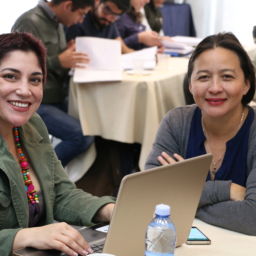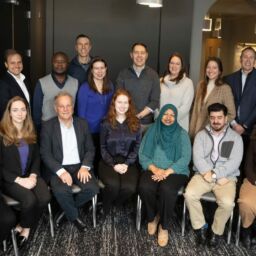This is the second of four blogs LINC is publishing to celebrate its 10th anniversary.
In the first post of our 10th anniversary series, “Getting to Know LINC”, we introduced readers to our history, our people, and the motivation behind our work, which is focused on supporting local actors to lead their own development. LINC’s commitment to this is reflected in our mission: “working alongside local actors to create sustained change.”
In this second entry, we dig into some of our work with local actors and share a bit of our experience gained during the last 10 years. We specifically discuss our approach to promoting the engagement, inclusion, and capacity strengthening of local actors as they lead development in their own communities.
As Patrick Sommerville, one of LINC’s founding partners, says: “The strongest evidence of our locally led development approach is the Mexico story”, which spans 10 years. Here is the story.
The Mexico Story
Shortly after our founding in 2013 our first client, Mexican nongovernmental organization Fondo Unido Mexico (FUM) (United Way Mexico), engaged LINC to support the capacity strengthening of Civil Society Organizations (CSOs) in Mexico City. Under this alliance, LINC designed and facilitated a workshop on project cycle management for 26 FUM partners and provided organizational capacity development support.
LINC and FUM’s initial partnership was a success. The positive reception by the participating organizations led to scaling up the workshops to other parts of Mexico, and in 2015 USAID to implement the four-year USAID/Mexico Local Capacity Development Activity (LCDA). The goal of LCDA was to deliver a comprehensive national training course (Diplomado) to build the capacity of Mexican CSOs, not just to acquire and manage donor funding for projects, but also to strengthen their partner networks, collaborate better, and deepen their understanding of the root causes of development challenges. LCDA was also LINC’s first direct funding from USAID.
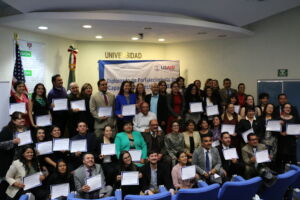
Under LCDA, not only was the Diplomado delivered to 179 Mexican CSOs with 285 executives receiving diplomas of completion, but FUM’s internal institutional capacity assessment score increased by 23%. (Access the LCDA Final Program Report here). In 2018, LINC formally transferred the Diplomado to FUM, which has continued to successfully deliver the course and strengthen the capacity of CSOs with non-USAID funding. Several of the participating CSOs have since received their own direct awards from USAID. After LCDA ended, FUM once again hired LINC to provide strategic support and continue strengthening their own institutional capacity (Read the case study here).
The LCDA success led to LINC being awarded the USAID Small Business of the Year Award in 2017 “for outstanding success in performing on USAID prime contracts in innovative and creative ways.” USAID also shared that:
“LINC showed flexibility and creativity, building new partnerships with local champions, government, and other USAID partners (…) increasing engagement with local system actors, including government and private resources. (…) LINC’s ability to understand the local context, interact with diverse actors, and coordinate stakeholders (…) to conduct the multi-stakeholder dialogues was impressive.”
The LINC-FUM case illustrates some of USAID’s principal lines of effort of locally led development: adapting programs to the unique local conditions and shifting power to local actors.
Traditionally, local partners have acted as instruments through which international actors implement their aid projects, rather than allowing for a more significant leadership role for local partners. In the LINC-FUM case, the training provided by LINC was based on individual and collective needs that were previously identified by FUM and its network. As the training progressed, organizations identified other needs within the group, and they requested an expansion of the technical assistance. In response, LCDA updated the Diplomado and included a module on complex social systems.
After LCDA: LINC’s Continued Support to Local Actors
LINC was further entrusted with accompanying and supporting the capacity strengthening of local organizations in Mexico when, in 2020, we were awarded the Multi-Stakeholder Strengthening Activity (MSA), in partnership with the Mexican organizations Corporativa de Fundaciones, in Jalisco, and the Fideicomiso para la Competitividad y Seguridad Ciudadana (FICOSEC), in Chihuahua.
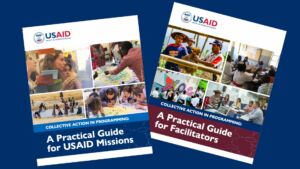
The purpose of MSA was to strengthen the capacity of CSOs, the government, and the private sector to collaborate on drafting and implementing concrete actions that contribute to crime and violence prevention, criminal justice reform, and an improved enabling environment to protect human rights.
In line with the commitment of allowing organizations to lead their own development, LINC provided technical assistance by facilitating and supporting multi-stakeholder dialogues. 89 Mexican organizations subsequently participated in a series of multi-stakeholder dialogues around five thematic areas, and by program end, 91.66% of the organizations improved their institutional performance, five action plans had been developed, and 144 individuals had been trained in institutional strengthening, helping bring to the front core capacities that would make MSA sustainable over time.
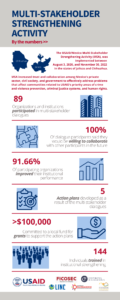
Locally Led Development in Practice
These are not, however, the only cases in which LINC has used a locally led approach in our programming. Locally led development and local capacity-strengthening principles are consistently embedded across our project portfolio.
We often begin program design by working to understand the environment and by identifying and mapping key actors, organizations, and sectors in the local systems where complex development challenges present themselves. Take our role in the USAID/Kosovo Up to Youth Activity (KUTY). As subcontractor to Global Communities, LINC’s first activity was to map the network of youth advocate resilience partners that had the greatest impact on youth engagement, to augment outreach and subsequent activities. LINC did not do this alone, but intentionally worked with youth for them to identify and interview local actors and to assess how well they address youth issues.
We also support the strengthening of the specific and diverse capacities of the actors that we work with. LINC uses participatory methods, like LINC’s work in the Action Learning Groups (ALG) under the Global Labor Program – Inclusive Futures (GLP-IF) in Kenya, and the Facilitating Financial Sustainability (FFS) Activity in Colombia and the Democratic Republic of the Congo (DRC); we create peer-to-peer learning opportunities like Communities of Practice, as we do under the USAID/Ethiopia Resilience Learning Activity (RLA) and the USAID/Ghana MEL Platform; and we provide training as we did under the LCDA and MSA activities in Mexico, FFS in Colombia, and the USAID/Local Solutions for Plastics Pollution (LSPP) Activity in Vietnam.
Conclusion
These are just some examples of the work that LINC has done in promoting and supporting locally led development, and even though we showcase these achievements proudly, we are the first to recognize that none of this would have been possible without the partnership and ideas, capabilities, and leadership of the local organizations who led these initiatives.
In addition to this blog, LINC will soon be publishing a parallel series exploring the Localization Agenda, its evolution – especially in USAID’s Local Capacity Strengthening Policy -, and where it might go next (and how LINC will contribute to this in its own right). Stand by for more here.
This blog was authored by Stephanie Lacouture.

